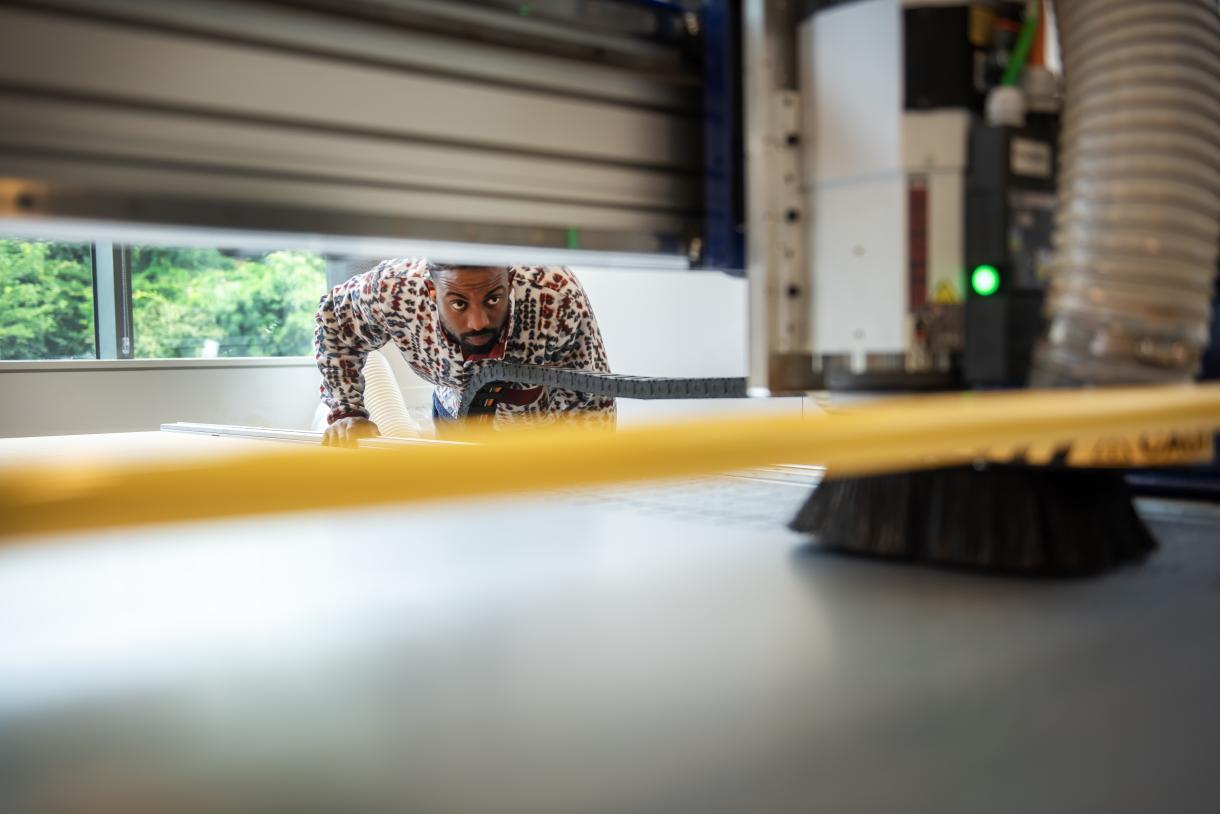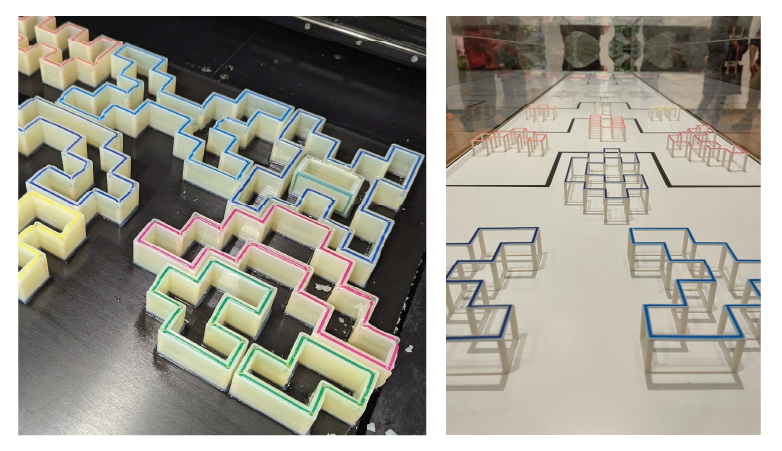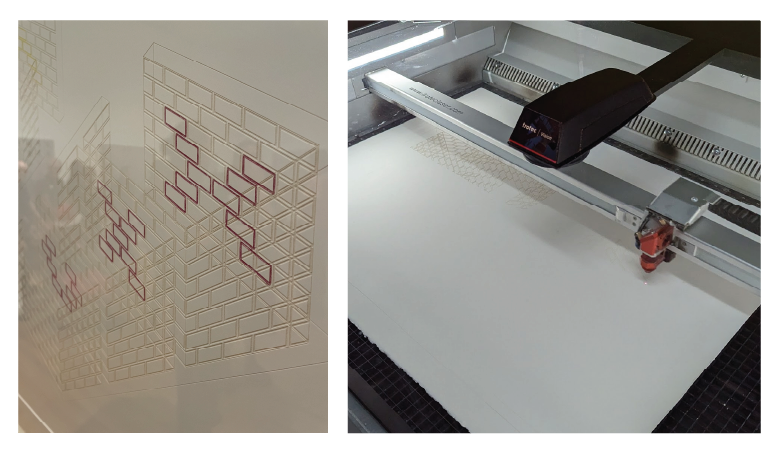
Blog
The Co-Lab's Nasher Debut - Processing Systems: Numbers by Sherrill Roland
Editor Note: After you've read this, check out the entirely AI-produced "podcast" about this article here: https://colab.duke.edu/blog-post/podcast-notebooklm/
---
On Friday, September 13, 2024, Sherrill Roland stood before a full-sized Shopbot CNC machine at Duke’s Innovation Co-Lab, watching a computer-controlled router carve his vision into an oversized piece of aluminum. Just six days later, he unveiled the finished work at the opening of his exhibit, Processing Systems: Numbers by Sherrill Roland, a show that marks not only an evolution of Roland’s art but also a unique collaboration between the Innovation Co-Lab and Duke’s Social Practice Lab.
This partnership is significant. Every piece in Roland’s exhibit was created using the tools, equipment, and expertise of the Co-Lab, underscoring our commitment to providing the Duke Community with cutting-edge technology for creative expression. As a space where technology, creativity, and collaboration intersect, the Co-Lab is proud to support artists like Roland in pushing the boundaries of digital fabrication to recontextualize and evolve their work.

The Social Practice Lab and Mellon Foundation Grant
The Social Practice Lab, directed by Pedro Lasch at Duke University’s Franklin Humanities Institute, brings together artists, scholars, and community members to explore social issues through collaborative art projects. By engaging with complex societal challenges, the lab fosters interdisciplinary partnerships, using art as a tool for social change.
In 2021, the Social Practice Lab received a $500,000 Mellon Foundation grant to expand its artistic research programs. This grant funds residencies, workshops, and community-engaged projects, and Roland’s exhibit is a powerful example of how the lab’s mission aligns with artistic expression. His work critiques the criminal justice system while exploring new ways to present these themes through technology.
Around the time that the SPL received this grant, Lasch began discussions with the Innovation Co-Lab about how we could be a partner in this endeavor. We envisioned a future where artists could be introduced to the tools and equipment and expertise of the Co-Lab in a way that provided new opportunities for tech-forward production of artwork. The Co-Lab’s mission has always included supporting the arts, and Roland’s residency gave us a concrete way to showcase how digital fabrication can transform an artist’s practice.

Sherrill Roland Recontextualizes His Work at Duke
Sherrill Roland is an artist whose work centers on themes of social justice, identity, and the criminal justice system. His personal experience with wrongful incarceration profoundly influences his work, notably in projects like The Jumpsuit Project, where he wears an orange jumpsuit in public spaces to challenge perceptions and spark conversations about the flaws in the justice system.
During his residency, Roland embraced a variety of resources Duke has to offer, integrating the ethos of the Social Practice Lab with his own vision. He explored the Nasher Museum archives, curating a sister exhibit called Seeing from the Block: Observing the Justice System through the Collection of the Nasher Museum, focused on incarceration and justice issues. Collaborating with researchers at the Wilson Center for Science and Justice, Roland drew on these discussions to inform the conceptual framework of his new body of work. And it was at the Innovation Co-Lab where Roland was able to push his boundaries, reimagining previous projects with the help of our digital fabrication tools.
Processing Systems featured seven large-scale numerical “portraits” resembling Sudoku puzzles, each re-encoding the Correctional Identification Number of a North Carolina exoneree. These were intricately engraved onto aluminum sheets using the Co-Lab’s CNC machines, allowing for monumental scale and precise detail. Roland’s 168.800 series, originally large steel sculptures filled with Kool-Aid, was reimagined using medical-grade 3D printing technology. The new technique allowed for extremely fine, multi-colored detail, transforming the pieces into a new symbolic language. Laser-etched drawings integrated the architectural layout of a prison with this encoded design, imagining how this language might appear in the walls of a cell.

Strengthening the Arts through Technology
Throughout this partnership, Roland’s openness to adapt his practice to new technologies exemplified the goals of both SPL/Mellon Grant and the Innovation Co-Lab. By leveraging advanced equipment, artists like Roland can unlock new dimensions of creativity, regardless of prior experience with these tools. His translation of his work in light of new materials and methods highlighted how the Co-Lab’s resources can inspire artistic evolution and open new avenues for social commentary.
Working with Sherrill Roland on Processing Systems was not just an honor, but also an embodiment of the Innovation Co-Lab’s mission�—to offer access to technology, knowledge, and expertise that empower creators from all backgrounds. Roland’s exhibit is a testament to the power of collaboration between art and technology, pushing creative boundaries and challenging the way we engage with important social issues.
Exhibition and CNC photos courtesy of J Caldwell (Nasher Museum). In-Process equipment photos courtesy of Isaac Rattey.



